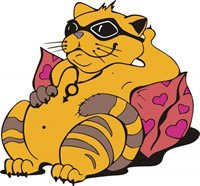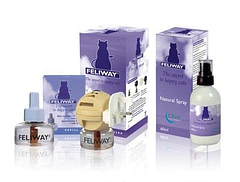Understanding Stress in Cats
 Stress in cats is little understood and a word which is not often mentioned in the feline world. Everyone knows what is meant by stress and virtually all of us suffer from it at some time in our lives. Some of us suffer from it constantly, yet we know little about it in animals. Cats, too, can suffer from stress and many of the visible problems could be said to be reactions to stress/anxiety. The interface between environment, behaviour and physiology is bared when our cats suffer from stress, and scientists are only slowly unravelling the complexities of it all.
Stress in cats is little understood and a word which is not often mentioned in the feline world. Everyone knows what is meant by stress and virtually all of us suffer from it at some time in our lives. Some of us suffer from it constantly, yet we know little about it in animals. Cats, too, can suffer from stress and many of the visible problems could be said to be reactions to stress/anxiety. The interface between environment, behaviour and physiology is bared when our cats suffer from stress, and scientists are only slowly unravelling the complexities of it all.
Causes of Stress in Cats
Stress is a very common cause of behavioural changes in cats. Situations that can lead to stress include alterations in owner routine and lifestyle, retention in an unfamiliar environment, such as at the vet’s surgery, or being locked in a cupboard accidentally. Overcrowding and prolonged exposure to worrying stimuli such as high frequency sound can induce stress, as can grief following the death of a companion, human or feline even or, occasionally, canine.
Cats can also find it stressful if, when with other cats, their flight distance is not maintained; this is the distance that they need in order to be assured of escape should trouble start. When our behavioural responses to challenge don’t succeed in reducing it, the adrenaline continues to flow in order to keep the body prepared. Stress is often the result, and in human terms is manifested by irritability, tiredness, anxiety and depression.
Symptoms of Stress in Cats
Less frequently reported in cats and perhaps only observable in the artificial confines of the experimental psychologist’s laboratory are convulsions, hysteric epilepsy, excessive salivation, panting, colic and even depigmentation of the skin (literally turning white with fear). The American veterinary surgeon and pet behaviourist Dr Bonnie Beaver also lists anorexia, pronounced sensitivity to touch, changes in taste preferences, diarrhoea, hair loss and even psychological neutering, an alarming prospect with which I am thankfully unfamiliar in UK cats as most of them have already been surgically neutered anyway. Additionally there are some peculiarly feline responses to certain types of stress, such as sweating from the footpads, urine spraying, and associative marking by scratching, urinating or defecating on socially or geographically significant areas.
Preventing Stress in Cats

The real question that we are posed with is how do you curb stress in cats? If stress is causing your cat a lot of harm or physical discomfort then it needs to be addressed. There are several solutions to this problem; some are effective and some are not. In addition to this some of them are ethical and some are slightly more questionable. For example there are plug in scented air dispensers to calm down pets. These contain certain substances that relax cats slowly over time and put them into a contented state. This is basically chemical relief; the owner has to decide however if they want to dope their pet happy or try and naturally solve the problem. In some cases (just like with humans) our stress problems can’t just be turned off. Therefore medicinal solutions may be the only option in a number of cases. However if you can clearly identify the source of your cats stress then it should be addressed. Taking away the problem or stimulus that is agitating your cat is the easiest way to increase its quality of life and happiness.
When it comes down to it, as the owner you know what is best for your cat. Use your judgement and decide what will increase the welfare of your pet most. The quality of their life lies in your hands and so I feel we have a responsibility to make it as good as possible.


